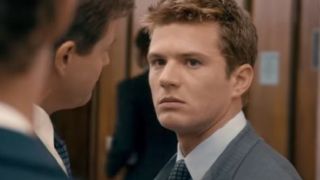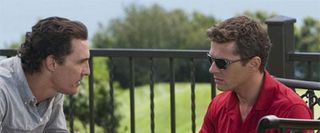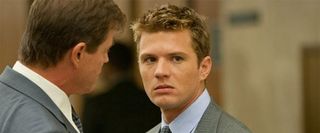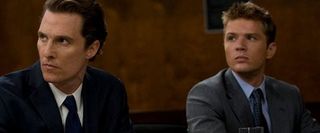Interview: The Lincoln Lawyer's Ryan Phillippe

Talk to most actors and they’ll tell you that it’s always more fun to play the villain. Thanks to societal rules, most of us have the decency to act civil towards one another, but there’s something freeing about letting your id loose and take control. It’s something that Ryan Phillippe most certainly got to do in his most recent film, Brad Furman’s The Lincoln Lawyer.
In the film, Phillippe plays a young, rich man who Matthew McConaughey’s character takes on as a client, believing in his innocence, but he slowly learns that the money he has been receiving has been coming from some very, very evil hands. Speaking with the actor as part of a roundtable interview, he discussed how he went about finding the mindset for such a despicable character, the hardest scenes that he had to shoot and what it was like shooting so close to home. Check out the interview below!
You look like you were really reveling in playing the bad guy.
I really was and I don’t know what that says about me but I enjoyed it, it’s fun to be the bad guy, it just is.
How do you get into that mindset?
In my career I’ve often played the protagonist or the hero of the movie and there are so many rules inherent to that role. The audience needs to stay with you, needs to identify with you, like you. When you play the bad guy those rules go out the window, there’s so much freedom there. The bulk of my research had to do with the novel and how that became such a reference tool, a bible for both Matthew [McConaughey] and I to check in with before we filmed certain scenes. And I also spent some time watching Joran van der Sloot. I had been watching interviews of him. I thought there was something about his arrogance, about his belief that he would get away with what he’s done that I thought related to this. But beyond that, it was just about trying to f with Matthew. You know, some scenes he’d win, some scenes I’d win, we didn’t rehearse very much intentionally, so that it would be fresh and we would be able to catch each other off guard, and I think we had pretty good, like, dude chemistry together.
What was your initial reaction upon reading the character they wanted you to play?
CINEMABLEND NEWSLETTER
Your Daily Blend of Entertainment News
You know they didn’t want me to play, necessarily. I had to fight for it, I had to audition for this, which is not always the case at this point in my career. But this character’s function to the movie is pretty integral so if it didn’t work that may have meant to the film itself didn’t work. So I think it was important to the filmmakers to see what an actor might do with it. Brad [Furman] told me about 200 guys auditioned for this part, and I was one of them, I had to go in. And that doesn’t bother me I think that makes sense. As I move into directing there are certain parts you kind of need to see what someone’s going to do with it and I felt like I had a good grasp, so I was ready to go and do that. The other reason, the motivating factor behind that is that a lot of what I’ve been reading the last couple of years has been thin and one dimensional and uninspiring, and so to read something that was like, I could actually sink my teeth in. That’s why we ended up with the ensemble we did. We have great actors in small-ish parts because of that fact because actors want substance and there just isn’t a lot of that out there right now.

What was it like working with Brad Furman?
It was great, you know we’re both from the same area and we are the same age so we have a lot of similar, cultural-type stones and that sort of thing. The greatest thing about Brad in reference to this movie is that in the hands of an older, more seasoned director, I think it could have fallen into more predictable territory. I think the fact that he was so, it was so important to him to really emphasize the hip-hop aspect of it, and to make sure that he shook it up, that there was an edge. That I think comes from the fact that he’s young, and that this is all still relatively new to him, and he was determined for it not to be boring. There were days on the set where if we were shooting something and he felt like it was standard he was like, “This is the most boring scene I’ve ever seen in my life!” And this is the director and so you try to find a way to kind of, like, just shake it up. I love that, I love that candor and his passion.
Is it easier to play someone evil? You know, you can let out and be kind of cathartic and therapeutic.
Absolutely, I think so. I mean, in terms of it being easier, I’m not sure. But it’s certainly more fun. And yeah, you know we all have some element of darkness however that manifests and I think its kind of cool to get it out of your system and go home and cook dinner for the kids. You know it’s like, when I was younger, it was much more difficult for me to separate myself from the work I was doing, like I was just stupid and dramatic and whatever, I’d get caught up in it. And now, as soon as they say wrap I’m out. I’m back to me, I’m in the car, the hip-hop’s on, I’m going home. It’s a much different approach now.
How difficult were the reenactments of the crime? I mean, because you kind of get a bit rough there.
Yeah, that certainly, all jokes aside, was the most difficult for me. I’ve got three sisters, I have a daughter, violence against women is beyond repugnant to me, and I’m incredibly sensitive. So two of the actresses and even a stunt woman, who often like to project that they are tougher than you are, I was really nervous for them and so at that point I didn’t feel like I was completely as lost or as immersed in those moments as I’d like to be because I was too concerned for their welfare. But, you know, those things are so heavily choreographed and rehearsed. That is the one part of the movie that it’s absolutely a must that you do over, over, and over, like a dance because the margin of error is very slim and people get injured on film sets all the time and I certainly didn’t want to be responsible for that.
Did everyone stay safe?
Yeah they did. But there was a take in which I threw the stunt woman through this mirror, and it’s real glass and she’s laying on the ground, surrounded by these jagged shards of mirror and it was not what I was supposed to do in the scene. I picked her up out of it as soon as they called cut and I think they kept it rolling. I think it’s still in the movie but I literally, I was so worried about her moving in any direction and being sliced open that I physically lifted her and carried her out of the mess.

Were those scenes harder because Michael had taken a lot of that from his personal journalism, so they were somewhat more real I guess?
I never really spoke to Michael [Connelly] until we were pretty well into shooting. I think he wanted to respect us. He certainly had approval of the script and how it was shaped, but he wasn’t... I know I could have reached out to him but it just, it never seemed germane really. But you know that sort of stuff is ugly no matter where it comes from.
At this point in your career how do you go about deciding what roles you’re going to play or what roles you’d like to play?
Well I know that one thing, you know I haven’t had the most successful box office career by any stretch, but I do like that I’m not so defined yet. You don’t look at me and say, “Oh that guy only makes those kind of movies,” or “He only plays those kind of parts.” If that were to ever happen I think I would lose all interest so it’s pretty much...and also at the same time you can have what looks like a great character and otherwise awful script and that’s not worth your while either so it really has to be about the totality of it and a story that compels you. I only want to make movies I want to see. And that may mean that my career is somewhat limited, but that is my version of integrity. That way, no matter what, how it performs, or how it’s received, I can be okay with it. I think the idea of being in a hugely successful movie that you don’t like would be just as bad as being in a film that you love that no one sees. I just, I wouldn’t want that kind of success, one that felt cheap or that I didn’t own.

What are you working on now?
I’m about to start shooting a movie called Chronicle in New York with Justin Long and John Hawks from Winter’s Bone, Ben Foster and Kate Mara, and it’s sort of the Wall Street of marijuana distribution it’s based on a short story. And I’ve got a film coming out called the Bang Bang Club about combat photographers at the end of apartheid. And I finished this action movie with Bruce Willis called The Setup this winter.
Those sound like great ones.
We’ll see, you hope.
Is part of the appeal is that it is a real true LA story, kind of keeps you close to home?
Oh yeah I mean because I’ve done nearly thirty movies now and parts of four have shot in LA. You hate having to go on location, especially once you have children. It was so great to be able to come home every day and sleep in my own bed and have dinner with the kids or see friends on the weekends. Also, LA has been a character in so many movies, but not necessarily from this perspective. You often see the palm tree lined streets of Beverly Hills, Bel Air, Malibu, but that’s… less than five percent of the citizens of the city live that way, so you’re kind of seeing a more authentic, gritty, LA, I think.
Will you go back and visit?
Downtown? Well I had lived here almost fifteen years and hadn’t spent that much time downtown and I kind of fell in love with it. I found, there’s this diner, The Nickel Diner down there that I take the kids to. They have all these crazy donut flavors and stuff, and there’s that sausage place Wurstküche that I discovered down there this German sausage, they have their rattlesnake sausage and rabbit sausage so it’s really, really interesting. So there’s some undiscovered gems down there that I’ve come to love.

Eric Eisenberg is the Assistant Managing Editor at CinemaBlend. After graduating Boston University and earning a bachelor’s degree in journalism, he took a part-time job as a staff writer for CinemaBlend, and after six months was offered the opportunity to move to Los Angeles and take on a newly created West Coast Editor position. Over a decade later, he's continuing to advance his interests and expertise. In addition to conducting filmmaker interviews and contributing to the news and feature content of the site, Eric also oversees the Movie Reviews section, writes the the weekend box office report (published Sundays), and is the site's resident Stephen King expert. He has two King-related columns.
Most Popular




